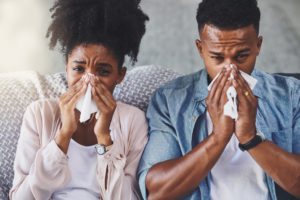
Recent studies are showing that people with allergies are also highly likely to have anxiety.
According to a Cincinnati Children’s Hospital Medical Center study, 7-year-old patients with allergies were found to also have been diagnosed with depression, anxiety, and other symptoms such as being withdrawn. Children with hay fever had a threefold risk of depression and anxiety.
Recently, more evidence has supported this link—and not just in children. A study of German adults, released in April, also found that generalized anxiety was linked to seasonal allergies.
If further research highlights this relationship between allergies and mental health, it could provide a fascinating glimpse into how our bodies might influence our minds, and possibly vice versa, according tothe study.
Two seemingly unconnected diseases, each affecting millions of Americans, could turn out to be not so different after all.
The most recent paper had different findings. Other researchers pointed out that the newest study’s authors didn’t adjust for factors such as socioeconomic status, the subjects had an average age of 61, and the data were based on the self-reporting of allergies.
Moreover, some studies have identified no link between allergies and anxiety, leading some researchers to think the studies that have found one simply have similar methodological issues. At this point, it’s safe to say that people with allergies are more likely to be anxious.
In 2013, a team of researchers found that not only were allergies associated with an increased prevalence of anxiety and other mood disorders in adults, but people who had been treated for their allergies were less likely to have mood or anxiety disorders than those whose allergies went untreated.
A small 2017 study found that kids with a food allergy were more likely to have anxiety or anxious behavior. Other studies have even identified a link between pollen allergies and an increased risk of suicide—a potential explanation for why suicides seem to rise in the spring. If the link is in fact real, allergies could be causing anxiety and other mood disorders in a few different ways.
For one, it’s stressful to be sick often, and people with allergies frequently feel like they have a bad cold. The experience of straining to breathe, or of coughing and wheezing, could simply make people feel anxious.
More studies need to be done to determine how, exactly, allergies might influence mental health. In the meantime, several researchers have explained that patients who suffer from both allergies and anxiety could benefit from understanding that the two might be connected.
Often, treating allergies can make someone’s depression and anxiety symptoms improve as well.

Jasmine Browley holds an MA in journalism from Columbia College Chicago, and has contributed to Ebony, Jet and MADE Magazine among others. So, clearly, she knows some stuff. Follow her digital journey @JasmineBrowley.








